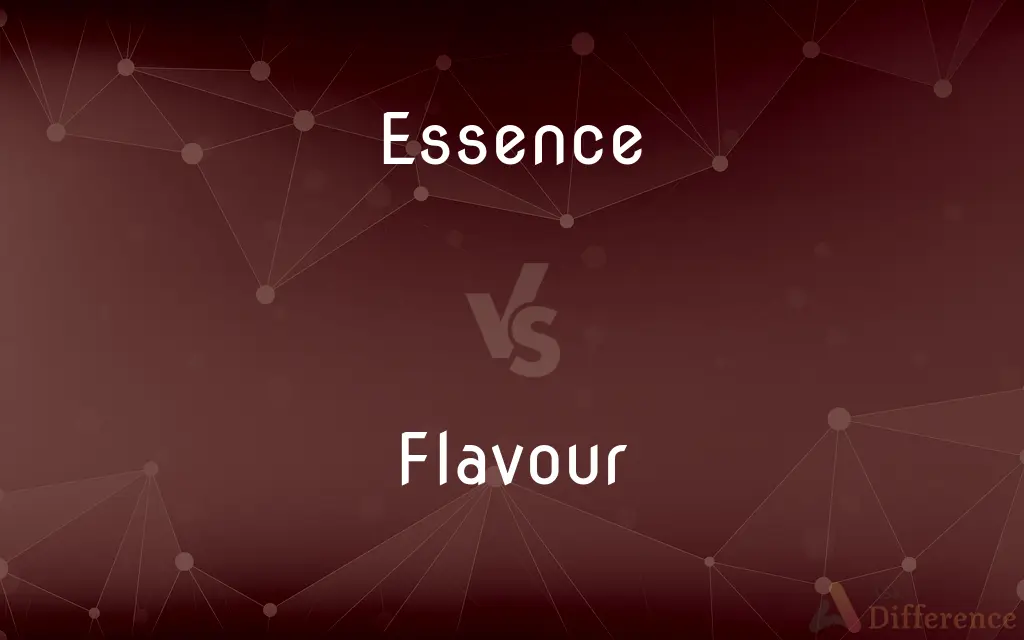Essence vs. Flavour — What's the Difference?
By Urooj Arif & Fiza Rafique — Updated on April 22, 2024
Essence refers to the intrinsic nature or indispensable quality of something, often abstract, while flavor is a sensory perception primarily tied to taste and smell, commonly associated with food and drink.

Difference Between Essence and Flavour
Table of Contents
ADVERTISEMENT
Key Differences
Essence captures the fundamental characteristics or qualities that define something, whether it's a concept, a person's spirit, or an object's core attributes. This term is philosophical and often used in discussions about the core properties that make something what it fundamentally is. On the other hand, flavor specifically relates to the sensory experience associated with food and drink, describing the combination of taste and aroma that characterizes a particular item.
The use of "essence" is broader and more abstract, often appearing in philosophical, literary, or spiritual contexts to discuss the underlying nature or crucial attributes of a subject. Whereas flavor is more concrete and sensory, used in culinary arts, food science, and everyday language to describe how things taste and smell, impacting the enjoyment and perception of food and beverages.
Essence often implies a deeper, sometimes metaphysical understanding of things, like discussing the essence of happiness or the essence of a cultural practice. In contrast, flavor is about practical, experiential qualities and is discussed in terms of ingredients, cooking methods, and individual perceptions that contribute to the overall sensory experience.
In product development, particularly in food and fragrances, "essence" can refer to a concentrated form of a flavor or aroma, intended to capture the most potent aspects of the original source. Meanwhile, the term "flavor" is used to denote the specific taste profiles developed using these essences, along with other components to create enjoyable and distinctive sensory experiences.
The appreciation of essence versus flavor can be subjective. Philosophers and artists might debate the essence of art or love, exploring concepts that go beyond physical or tangible properties. In contrast, chefs and food enthusiasts discuss flavors in terms of balance, harmony, and innovation in dishes, focusing on tangible sensory details and reactions.
ADVERTISEMENT
Comparison Chart
Definition
Intrinsic nature or core quality.
Sensory perception of taste and smell.
Context
Philosophical, abstract.
Practical, sensory, culinary.
Usage
Discusses fundamental characteristics.
Describes specific sensory experiences.
Associated Fields
Philosophy, literature, metaphysics.
Culinary arts, food science.
Example Application
Essence in fragrance as a concentrated attribute.
Flavor in cuisine as a profile of taste and smell.
Compare with Definitions
Essence
The intrinsic nature or indispensable quality of something.
The essence of her argument was about fairness.
Flavour
A combination of taste and aroma perceived during eating.
The flavor of the coffee is enhanced by its aroma.
Essence
A vital or indispensable quality.
Trust is the essence of their relationship.
Flavour
Descriptive of taste experiences.
He experimented with different flavors to perfect the recipe.
Essence
A term in philosophy referring to the inherent nature of things.
Scholars debate the essence of truth in different contexts.
Flavour
The distinctive taste of food or drink.
The chef is renowned for the bold flavors in his dishes.
Essence
A concentrated form of a substance capturing its key qualities.
Vanilla essence is used to enhance the flavor of desserts.
Flavour
A specific taste quality or type.
Lemon adds a fresh flavor to the salad.
Essence
Core characteristic or fundamental feature.
The essence of democracy is the participation of citizens.
Flavour
The sensory impression of food or other substances.
The flavor of this cheese is particularly sharp.
Essence
Essence (Latin: essentia) is a polysemic term, used in philosophy and theology as a designation for the property or set of properties that make an entity or substance what it fundamentally is, and which it has by necessity, and without which it loses its identity. Essence is contrasted with accident: a property that the entity or substance has contingently, without which the substance can still retain its identity.
Flavour
Variant of flavor.
Essence
The intrinsic nature or indispensable quality of something, especially something abstract, which determines its character
Conflict is the essence of drama
Flavour
Standard spelling of flavor#Noun
The flavour of this apple pie is delicious.
Flavour was added to the pudding.
What flavour of bubble gum do you enjoy?
The flavour of an experience.
Debian is one flavour of the Linux operating system.
Essence
An extract or concentrate obtained from a plant or other matter and used for flavouring or scent
Vanilla essence
Flavour
Standard spelling of flavor#Verb
Essence
The intrinsic or indispensable quality or qualities that serve to characterize or identify something
The essence of democracy is the freedom to choose.
Flavour
The general atmosphere of a place or situation and the effect that it has on people;
The feel of the city excited him
A clergyman improved the tone of the meeting
It had the smell of treason
Essence
(Philosophy) The inherent, unchanging nature of a thing or class of things, especially as contrasted with its existence.
Flavour
(physics) the kinds of quarks and antiquarks
Essence
The most important part or aspect of something
The essence of her argument is that the policy is wrongheaded.
Flavour
The taste experience when a savoury condiment is taken into the mouth
Essence
An extract that has the fundamental properties of a substance in concentrated form.
Flavour
Lend flavor to;
Season the chicken breast after roasting it
Essence
Such an extract in a solution of alcohol.
Essence
A perfume or scent.
Essence
One that has or shows an abundance of a quality as if highly concentrated
A neighbor who is the essence of hospitality.
Essence
Something that exists, especially a spiritual or incorporeal entity.
Essence
The inherent nature of a thing or idea.
Essence
(philosophy) The true nature of anything, not accidental or illusory.
Essence
Constituent substance.
Essence
A being; especially, a purely spiritual being.
Essence
A significant feature of something.
Essence
The concentrated form of a plant or drug obtained through a distillation process.
Essence of Jojoba
Essence
An extract or concentrate obtained from a plant or other matter used for flavouring, or as a restorative.
Vanilla essence
Essence
Fragrance, a perfume.
Essence
The constituent elementary notions which constitute a complex notion, and must be enumerated to define it; sometimes called the nominal essence.
Essence
The constituent quality or qualities which belong to any object, or class of objects, or on which they depend for being what they are (distinguished as real essence); the real being, divested of all logical accidents; that quality which constitutes or marks the true nature of anything; distinctive character; hence, virtue or quality of a thing, separated from its grosser parts.
The laws are at present, both in form and essence, the greatest curse that society labors under.
Gifts and alms are the expressions, not the essence of this virtue [charity].
The essence of Addison's humor is irony.
Essence
Constituent substance.
And uncompounded is their essence pure.
Essence
A being; esp., a purely spiritual being.
As far as gods and heavenly essencesCan perish.
He had been indulging in fanciful speculations on spiritual essences, until . . . he had and ideal world of his own around him.
Essence
The predominant qualities or virtues of a plant or drug, extracted and refined from grosser matter; or, more strictly, the solution in spirits of wine of a volatile or essential oil; as, the essence of mint, and the like.
The . . . word essence . . . scarcely underwent a more complete transformation when from being the abstract of the verb "to be," it came to denote something sufficiently concrete to be inclosed in a glass bottle.
Essence
Perfume; odor; scent; or the volatile matter constituting perfume.
Nor let the essences exhale.
Essence
To perfume; to scent.
Essence
The choicest or most essential or most vital part of some idea or experience;
The gist of the prosecutor's argument
The heart and soul of the Republican Party
The nub of the story
Essence
Any substance possessing to a high degree the predominant properties of a plant or drug or other natural product from which it is extracted
Essence
The central meaning or theme of a speech or literary work
Essence
A toiletry that emits and diffuses a fragrant odor
Common Curiosities
What is the difference between essence and flavor?
Essence is about fundamental qualities or characteristics, often abstract, while flavor is specifically the sensory experience related to taste and smell.
How do chefs use the concept of flavor?
Chefs focus on developing and balancing flavors to create appealing and harmonious taste experiences in their dishes.
What role does essence play in philosophy?
In philosophy, essence refers to the fundamental nature or underlying properties that define the existence or identity of a subject.
Can essence be measured?
While essence in a philosophical or abstract sense cannot be measured, in a physical sense (like fragrance or extract), it can be quantified based on concentration.
Can the essence of a food be its flavor?
In a metaphorical sense, one might say the essence of a food is its defining flavors, but technically, essence refers to intrinsic qualities, not just sensory ones.
How do manufacturers capture the essence of flavors in products?
Manufacturers use techniques like distillation and extraction to concentrate the chemical compounds that deliver key flavors and aromas.
Can the essence of an experience be similar to its flavor?
Metaphorically, yes. The "essence" of an experience can encompass the core emotions or characteristics, similar to how flavor encompasses the core sensory perceptions of food.
Is vanilla extract the same as vanilla essence?
Vanilla extract is made from actual vanilla beans, while vanilla essence is usually synthetic and designed to mimic the flavor without using natural beans.
Why is understanding flavor important in cooking?
Understanding flavor is crucial for creating dishes that are enjoyable and balanced, catering to various taste preferences and enhancing the overall dining experience.
Does the concept of essence apply to people?
Yes, in a non-physical sense, discussing someone's essence might refer to their core personality traits or what fundamentally defines them as a person.
What impact does flavor have on food marketing?
Flavor is a critical factor in food marketing, as appealing flavors can drive consumer preference and product success.
How do cultural differences influence the interpretation of essences and flavors?
Cultural backgrounds can shape how individuals perceive and value certain essences and flavors, affecting preferences and interpretations in diverse contexts.
Are there ethical considerations in using synthetic essences?
Yes, ethical considerations include transparency about ingredients, potential health impacts, and environmental effects of production.
What does 'capturing the essence' mean in creative work?
In creative work, capturing the essence means distilling a subject to its most meaningful, powerful elements, similar to how an essence in cooking or fragrance captures fundamental flavors or scents.
How do personal tastes affect perception of flavors?
Personal tastes, influenced by cultural, genetic, and individual factors, significantly affect how flavors are perceived and enjoyed.
Share Your Discovery

Previous Comparison
Pause vs. Resume
Next Comparison
Druggist vs. ChemistAuthor Spotlight
Written by
Urooj ArifUrooj is a skilled content writer at Ask Difference, known for her exceptional ability to simplify complex topics into engaging and informative content. With a passion for research and a flair for clear, concise writing, she consistently delivers articles that resonate with our diverse audience.
Co-written by
Fiza RafiqueFiza Rafique is a skilled content writer at AskDifference.com, where she meticulously refines and enhances written pieces. Drawing from her vast editorial expertise, Fiza ensures clarity, accuracy, and precision in every article. Passionate about language, she continually seeks to elevate the quality of content for readers worldwide.
















































